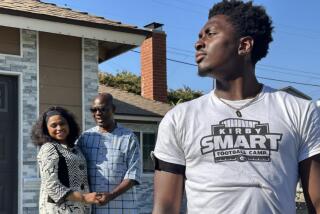‘My American Dream Still Lives’
- Share via
Recently, the governing association for high school sports--the California Interscholastic Federation--ruled that 17-year-old senior Nkeruwem Anthony Akpan, the 6-foot-7 Inglewood High School basketball center, is ineligible to play. His team had to forfeit the four games in which he played and faces the loss of its Bay League championship. According to CIF rules, an athlete must have lived in the United States for a year before he is eligible to compete in varsity high school sports. Akpan moved to Newark, N.J., in September 1999 from Nigeria.
Patrick Roy, the head coach for the Inglewood High School boys basketball team, considers Akpan one of the best players he has ever coached. Roy and his team dub Akpan the “Nigerian Nightmare,” saying that whoever faces him is in for trouble.
Akpan’s American experience has not been easy. Yet Akpan is content. He is getting an education. He talked with MARY REESE BOYKIN.
*
My American dream is to have a better education. For me, education--not basketball--always comes first. I came to the U.S. from my native Nigeria to finish high school and go to college so that I can have a better opportunity for a career in international relations or estate management. Ultimately, I want to go back to my country and own a business.
In Nigeria, my sports interests were more to soccer, volleyball and handball. At 15, I began to play basketball since all of my friends played basketball. The footwork was easy because I played soccer. My uncle, who lives in the United States, felt I could play basketball and have a better education in America.
I came to Newark in September 1999. It was during soccer tryouts. When the coach told me that I was responsible for buying my own cleats for the soccer team, I lost interest.
I was playing basketball at a park one day in Newark when people told me how well I play. When I told them that I am from Nigeria, they were surprised because many people see basketball as an American sport. The basketball coach wanted me to play because of my height. I made the team.
But I was ineligible for the Newark team because I had not lived in the United States for a year. I enrolled at Inglewood High School a month ago. I played four games but, again, was ruled ineligible because I have lived in the United States for less than a year. I wonder if any of this would have mattered if I sat on the bench. If I go back to Nigeria, I cannot reenroll in school until 2001 because of our registration and final exams procedures.
All I wanted in the United States was to get an education without distractions. In my country, the Yoruban and Hausan tribes had conflicts. Sometimes, my parents were afraid for me to go to school because they feared I would get caught in the tribal fights. There were religious wars when Nigeria changed from military to civilian rule. My parents were afraid that I would witness another civil war. Because of problems back home, I was out of school in 1995 for three months.
Getting an education was different in Nigeria. In Nigeria, I had to walk 30 minutes to get to a boat that carried me to the school complex. Throughout high school, students could get a spanking for making just a passing grade. Our teachers wanted us to make the highest grades we possibly could. If a student’s name appeared on the list of noisemakers or on the list for talking rudely to the teacher, the student was spanked.
So I came to Newark with my African values. When the teacher called on me to answer a question, I stood up to address her. That was unusual among my American classmates. One day, when a girl wanted to ask the teacher, who was on the other side of the classroom a question, the girl said to the teacher, “Hey, come here!” I expected that girl to get a whipping because in Nigeria, if a teacher comes into a classroom, the entire class stands in respect.
A few days ago, after a teacher read in the newspaper that I am ineligible to play basketball, she asked me, “Has your American dream been tarnished?” I answered, “Ma’am, I came to the U.S. to get an education. Education comes first. I am still in school, so I still have my American dream.”
More to Read
Get our high school sports newsletter
Prep Rally is devoted to the SoCal high school sports experience, bringing you scores, stories and a behind-the-scenes look at what makes prep sports so popular.
You may occasionally receive promotional content from the Los Angeles Times.






